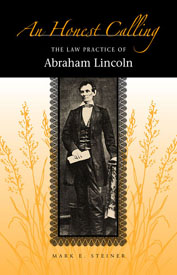Mr. Lincoln, The Lawyer
 I recently suggested (using a joke I heard from my colleague Lawrence Kohl) that if you want to sell books, write one about Mrs. Lincoln's cat. This evening I had the great pleasure of reading one on a topic about as good: Abraham Lincoln, lawyer. It's Mark Steiner's An Honest Calling: The Law Practice of Abraham Lincoln, which has just appeared from Northern Illinois Press. I highly recommend this one; and I suspect it'll sell. Great combination of topics: Lincoln and law. There's even a chapter on slavery (on a case involving fugitive slaves, Jane Bryant and her four children, where Lincoln represented the owner). You'll be hearing a lot about this book. This is the kind of respectful but searching treatment of Lincoln that wins Pulitzer Prizes (as evidenced when Mark E. Neely's Fate of Liberty won).
I recently suggested (using a joke I heard from my colleague Lawrence Kohl) that if you want to sell books, write one about Mrs. Lincoln's cat. This evening I had the great pleasure of reading one on a topic about as good: Abraham Lincoln, lawyer. It's Mark Steiner's An Honest Calling: The Law Practice of Abraham Lincoln, which has just appeared from Northern Illinois Press. I highly recommend this one; and I suspect it'll sell. Great combination of topics: Lincoln and law. There's even a chapter on slavery (on a case involving fugitive slaves, Jane Bryant and her four children, where Lincoln represented the owner). You'll be hearing a lot about this book. This is the kind of respectful but searching treatment of Lincoln that wins Pulitzer Prizes (as evidenced when Mark E. Neely's Fate of Liberty won).Steiner uses the Lincoln legal papers to get a look at Lincoln the lawyer, as well as at legal practice and legal thought more generally in the years leading into the Civil War (what historians call the antebellum period). So this book aims at making contributions to several fields: first and most directly, our knowledge of Lincoln. Previous biographers have done relatively little with Lincoln's legal practice (though there is an important paper on pleading in Illinois, which Eric Freyfogle wrote around 1991 and which David Donald used in his 1996 biography of Lincoln). So Steiner's able to tell us about Lincoln's legal training and the books he used. For someone like me who enjoys libraries and tries to draw inferences from the books in libraries, the table of books that Lincoln cited in cases has particular interest. The average reader will likely be interested in learning about Lincoln's caseload, which ran from defamation, to debts, to land titles. Steiner draws on a wealth of records to depict Lincoln's life.
What I like about the book is the way Steiner uses Lincoln to address a series of questions critical to legal history, including
- how legal treatises were used in training and practice (which is the province of legal historians like Michael Hoeflich and Whitney Bagnall)
- why Whigs were more prevalent among lawyers than Democracts and what meaning that had for the development of legal doctrine (which has mostly been discussed by historians like Lawrence Kohl and Daniel Walker Howe)
- the boundaries of legal ethics, such as how much were lawyers bound to help their clients (which has been debated recently by Russell Pearce and Norman Spaulding)
- the duty that a lawyer has to their own internal morality as opposed to a more universal duty to constitutional union (discussed by many, including Robert Cover, Mark Tushnet and me, too).
- the role of legal doctrine in promoting economic growth (what Morton Horwitz called the "instrumental conception" of law, which has been discussed by many others including William Nelson, Peter Karsten, and Paula Dalley).
Still, virtually everyone who asks the kinds of questions that Steiner does has approached them from reported cases, rather than individual lawyers. The look from this vantage is rather different. Because I'm on record as a strong supporter of Morton Horwitz' Transformation of American Law, 1780-1860, let me make one effort at squaring Horwitz and Steiner. First some background: Horwitz identifies a key aspect of antebellum jurisprudence as the emergence of an "instrumental conception" of law: that judges self-consciously re-crafted the law to promote economic growth. I think there's a lot of evidence to support this (or a moderate version of it). I see two key pieces here
- that judges thought the common law incorporated principles that the law evolves in light of progress in moral and economic thought--not too controversial, but I'm happy to talk about this depth in later posts;
- judges employed utilitarian principles, in keeping with the dominant moral philosphy of the era.
There are some other things to speculate on here: what is the relationship between Lincoln's political theory (as seen in places like his Lyceum Speech) and his legal practice. Anyway, I think Steiner's new sources shift, rather dramatically, our understanding of antebellum legal history. I also think this ought now t become a central text in legal history, because it allows us to grapple with some many issues: morality; common law change; legal ethics; slavery, all in one place. One more piece of praise--it reminds me a lot of one of my favorite works in legal history, Robert Palmer's English Law in the Age of the Black Death--because it joins a deep understanding of legal doctrine with history.
You'll enjoy it and will be hearing a lot about An Honest Calling in the future.

0 Comments:
Post a Comment
<< Home